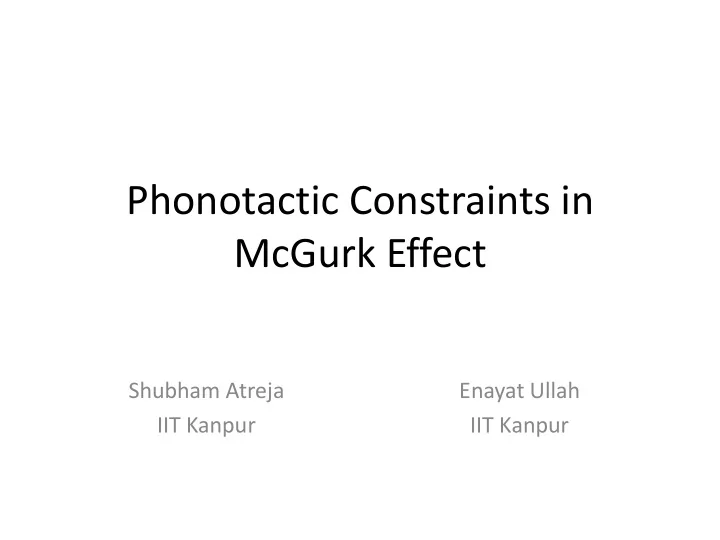

Phonotactic Constraints in McGurk Effect Shubham Atreja Enayat Ullah IIT Kanpur IIT Kanpur
Speech Perception • Audio-visual phenomenon • Usually audio and video sources are coherent • What if information from visual channel is not coherent?
McGurk Effect - Mcgurk and Mcdonald in 1976 • Speech Perception- Importance of visual information • Information in audio and video channels is not coherent • Uniqueness- Fusion is also meaningful Auditory Stimuli Visual Stimuli Fused Stimuli ba-ba ga-ga da-da ka-ka pa-pa ta-ta
PHONOTACTICS
LEFT LEFK LEFP
MAFT MAFP MAFK
Phonotactic Constraints Branch of phonology that deals with restrictions on the permissible combinations of phonemes. • Different rules for different languages o /st/ is valid in English, not valid in Japanese • Different rules for different types of phonemes o /ft/ is valid; /fp/ and /fk/ are not • Rules also depend on the location inside the word. o Onset - /sp/ ; Ex- SPeak o Coda - /ps/ ; Ex- laPSe
What we are aiming at • Study the Mcgurk effect occurring in words • Introduce a bias and study its influence on Mcgurk effect • Establish the importance of phonotactic constraints while perceiving spoken words
Previous Work • Windmann discovered how sentence context and expectation affected the Mcgurk illusion in German language [2] • The results proved that that the sentence context did influence the strength of the McGurk effect • Azra N. Ali did a similar work on sentences in English, giving the same results [3]
Experimentation • Visual clips with spoken words (Coherent and Incoherent) • Incoherent audio-video leads to a fused word (Mcgurk Effect) • Subject has to repeat the perceived word • All the words ( spoken and fused) are meaningless
Cases • Control Cases (Coherent audio - video) Phonotactically licensed word Phonotactically restricted word • Test Cases (Incoherent audio - video) Spoken and Fused words are phonotactically licensed Only Spoken words are phonotactically licensed Only Fused words are phonotactically licensed
References [1] McGurk, H., & MacDonald, J. (1976); Hearing lips and seeing voices. Nature, 264, 746-748. [2] Windmann, S., "Effects of sentence context and expectation on the McGurk illusion", J. Memory and Language, Vol 50, 2004. [3] Ali A. N. (2007). Exploring semantic cueing effects using McGurk fusion, in Auditory-Visual Speech Processing (Hilvarenbeek: Kasteel Groenendaal) [4] Keren B. Shatzman & René Kager , “A role for phonotactic constraints in speech perception”; ICPhS 2007
Recommend
More recommend